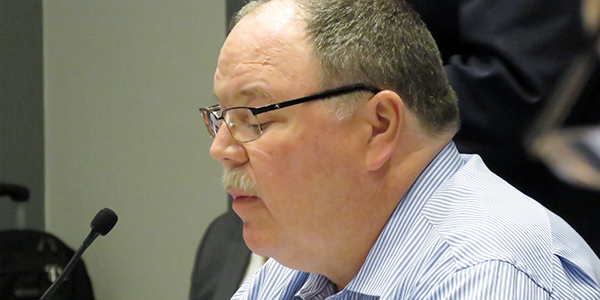By Rich Heidorn Jr.
The NERC Standards Committee on Wednesday delayed the posting of a standard authorization request (SAR) by SPP on generator weatherization because of a competing proposal from the Edison Electric Institute.
SPP proposed the SAR in response to the joint FERC and NERC staff report on the Jan. 17, 2018, cold weather event in the South Central U.S., which caused MISO and SPP to seek voluntary load reductions and nearly forced load shedding in MISO South.
The committee balked at posting SPP’s SAR for comment after Soo Jin Kim, manager of standards development, announced that NERC had received a competing SAR from EEI the previous day — too late for it to be considered on the agenda.
SPP’s SAR proposed development of a standard “to include such activities as winterization activities on generating units, winter-specific and plant-specific operator awareness training, and processes to ensure [balancing authority] and [reliability coordinator] awareness and accounting of unit limitations in performing operational planning analysis, and determining contingency reserves.”
Charles Yeung, SPP executive director of interregional affairs, amended the SAR to eliminate a reference to “fuel assurance” among its deliverables. “I’m trying to anticipate the alternate SAR because there was a concern about fuel assurance,” he said.
Several committee members said that the competing SARs should be posted simultaneously. “I think if they’re not posted concurrently … it will be extremely confusing,” said Jennifer Flandermeyer, director of federal regulatory policy for Kansas City Power & Light.
Howard Gugel, NERC director of engineering and standards, suggested the committee delay posting SPP’s SAR until the SC’s Executive Committee reviews the EEI proposal and then post them together.
After a lengthy debate, the committee voted 10-7 not to post the SPP proposal. It then approved on a voice vote a motion to remand the initial SAR back to SPP and direct the RTO to work with EEI to reconcile the differences between the two proposals. The EEI proposal was not publicly available as of Thursday, and an EEI spokesman did not respond to a request for comment.
The FERC/NERC report, released in July, said the need for a new reliability standard to improve generators’ winter performance was demonstrated by the 2018 incident as well as the large-scale unplanned outages during the 2014 polar vortex and the 2011 Southwest cold weather event.
The report found 183 generating units in the RC footprints of SPP, MISO, Tennessee Valley Authority and Southern Co. suffered an outage, derate or failure to start between Monday, Jan. 15, and Thursday, Jan. 19.
It said generator owners and operators should be required to winterize their units and provide their RCs and BAs with information about their preparations.
Operating Committee Debate

At the NERC Operating Committee meeting in Minneapolis last week, however, some stakeholders questioned regulators’ authority to issue such requirements, citing arguments that helped sink such an initiative in 2013. (See Déjà vu for Winterization Standard?)
Several said it would be improper to penalize generators if they suffered forced outages during severe weather.
“If you have power plants that haven’t run in weeks and you wait until the coldest day of the year to start them, you should anticipate a couple may have problems starting up,” said Allen Schriver, general manager of compliance for NextEra Energy Resources and COO of the North America Generator Forum.
“Whatever this SAR ends up being can’t mess up incentives already out there in the markets,” said Dan Woodfin, ERCOT’s senior director of system operations.
James Merlo, NERC director of reliability risk management, promised that a standard would not be punitive or require specific weatherization requirements.
“Some people have an expectation that we would say, ‘Winterize your generator. Use heat tracers.’ We don’t have standards like that,” he said.
“The expectations would be that you at least have a [winter operating] plan, and you’re going to operate to that plan. If you say you have firm fuel, then the expectation is that is what you purchased. … There were generators that said, ‘This is what I can operate at.’ Some of them were as low as -10 degrees Fahrenheit. We didn’t get … anywhere near that,” yet the units suffered outages, he said.
“Sometimes a standard is [about] getting everybody up to the same level of expectation,” he continued. “And when you have units telling us. … ‘We don’t have a cold weather preparedness plan. We don’t know what our temperature operating characteristics are; that’s troubling. It’s really beyond troubling. … Everybody sitting here is [saying] well, ‘That’s not my company.’ Well, it was someone’s company. It was several companies that gave these replies.”
John Stephens, director of power system control for City Utilities of Springfield, Mo., said he was troubled by recommendation 11 in the report, which said that when MISO relies on 3,000 MW of regional directional transfer (RDT) flows in determining reserve levels for MISO South, “it should remain mindful that … ‘any amount above 1,000 MW of the 3,000 MW north-to-south limit … [is] only available on a non-firm, as-available basis.’”
“If either party is depending on non-firm service to maintain reliability, you’ve already failed,” Stephens said.
“Non-firm is exactly what it says. If you and I go out on a boat and I [say] you can borrow my life preservers as long as I don’t need it, that’s non-firm,” he said, prompting laughter.
In response to a question from Stephens, David Zwergel, MISO’s senior director of regional operations, initially said the RTO did rely on the non-firm portion of the RDT for deliverability of its reserves.
After a break in the meeting, however, Zwergel said he needed to make a correction. “I checked back with our experts, and with the changes we’ve made, we do not rely on that non-firm capability for deliverability of reserves,” he said.








